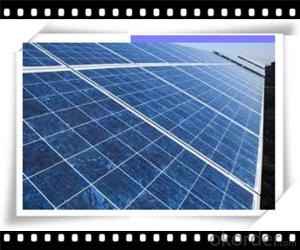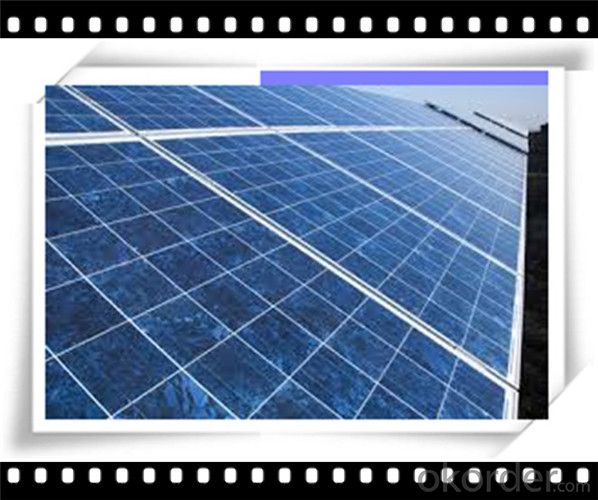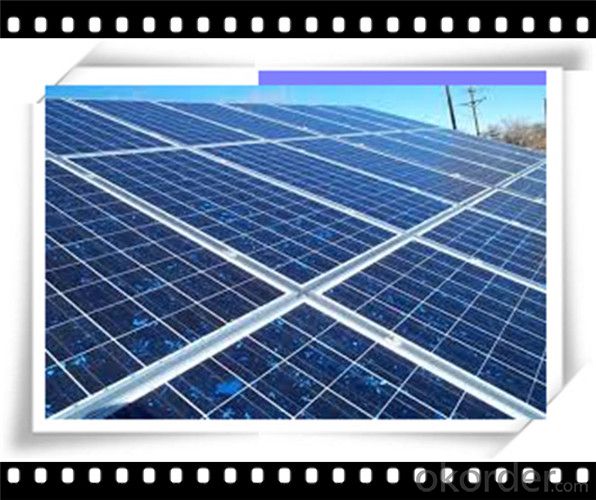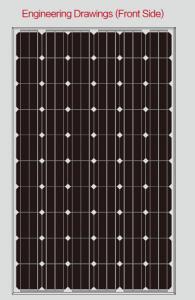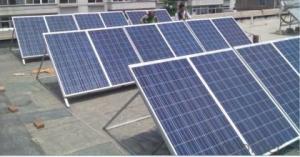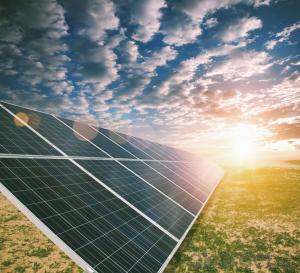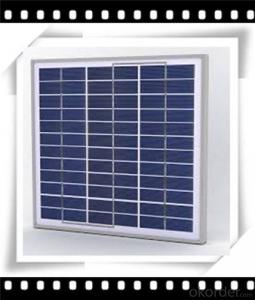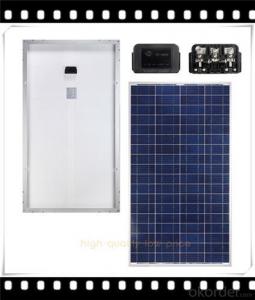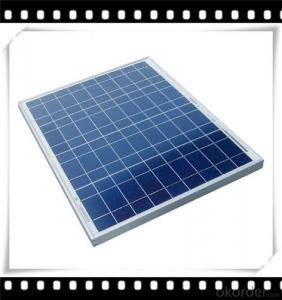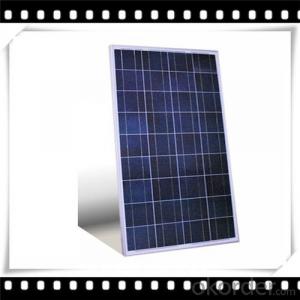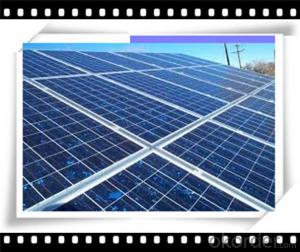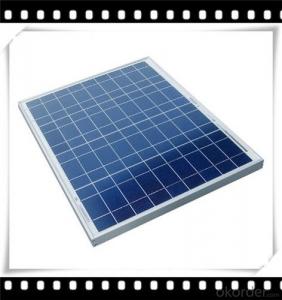QC Solar Panels 50W Poly Mini Newest CNBM Solar Panel
- Loading Port:
- Qingdao
- Payment Terms:
- TT OR LC
- Min Order Qty:
- 10 set
- Supply Capability:
- 300000 set/month
OKorder Service Pledge
OKorder Financial Service
You Might Also Like
Polycrystalline Solar Modules
CNBM offers a range of small, medium and large polycrystalline solar modules, designed for a range of requirements.
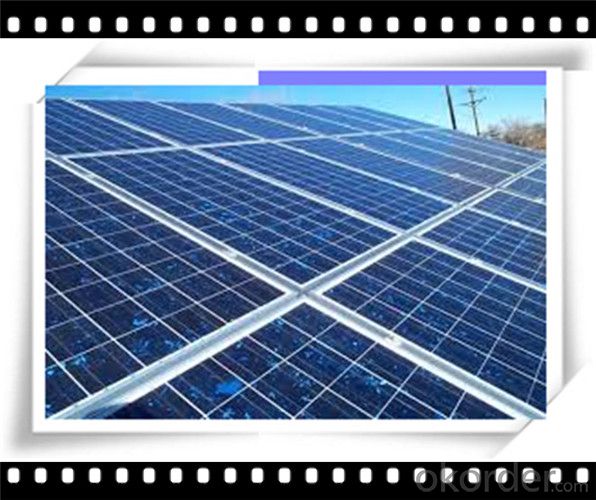
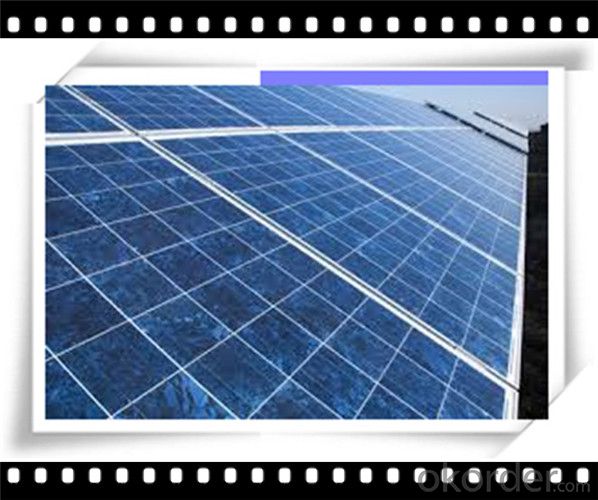
Specifications:
+/-3% |
Polycrystalline silicon solar cells (156 x 156mm) |
60 (10 x 6) |
1650 x 990 x 40 |
25.5 |
Limits:
Operating Temperature | -40~+85? |
Storage Temperature | -40~+85? |
Maximum System Voltage | 1000 VDC max. |
Hail Impact | Diameter of 28mm with impact speed |
Temperature and Coefficients:
NOCT | 48C+/-2? |
Voltage temperature coefficient (%/K) | -0.35 |
Current temperature coefficient (%/K) | 0.05 |
Power temperature coefficient (%/K) | -0.45 |
Characteristics:
Model: | SGM-200P | SGM-210P | SGM-220P |
Max-power voltage Vmp (V) | 29.2 | 29.4 | 29.41 |
Max-power current Imp (A) | 6.85 | 7.14 | 7.48 |
Open-circuit voltage Voc (V) | 36.5 | 36.69 | 36.9 |
Short-Circuit Current Isc (A) | 7.28 | 7.6 | 7.93 |
Max-power Pm(W) | 200 | 210 | 220 |
Model: | SGM-230P |
Max-power voltage Vmp (V) | 29.8 |
Max-power current Imp (A) | 7.72 |
Open-circuit voltage Voc (V) | 37.31 |
Short-Circuit Current Isc (A) | 8.19 |
Max-power Pm(W) | 230 |
STC: Irradiance 1000W/m2, module temperature 25?, AM-=1.5
Poly Crystalline Solar Panels Specifications Range
Maximum Power (Pm) | Dimension | Weight | Operating Voltage (Vmp) | Operating Current (Imp) | Open Circuit Voltage (Voc) | Short Circuit Current (Isc) |
0.45W | 140x80x10mm | 0.08kg | 3.3V | 150mA | 4.6V | 160mA |
1.0W | 162x140x10mm | 0.16kg | 7.5V | 150mA | 10.3V | 160mA |
4.5W | 269x251x23mm | 0.8kg | 16.5V | 0.27A | 20.5V | 0.3A |
10W | 420.1×268.9×22.6mm | 1.92kg | 17.5V | 0.58A | 20.5V | 0.6A |
20W | 425x502x50mm | 3.0kg | 16.8V | 1.19A | 21.0V | 1.29A |
30W | 593x502x22.6mm | 3.9kg | 16.8V | 1.78A | 21.0V | 1.94A |
40W | 655x537x50mm | 5.75kg | 17.3V | 2.31A | 22.1V | 2.54A |
50W | 839x537x50mm | 6.0kg | 17.5V | 2.9A | 21.8V | 3.17A |
65W | 1111x502x50mm | 7.2kg | 17.6V | 3.69A | 22.1V | 3.99A |
80W | 1204x537x50mm | 7.7kg | 17.6V | 4.55A | 22.1V | 4.8A |
- Q: I am searching for producers or distributors of solar panels. Thanks!
- There are ton's of distributor around that can provide you a cheap solar panel that didn't came from China. Expand your knowledge and learn from a renowned solar company about the Best Solar Panels. Visit our site and contact us today!
- Q: Can solar panels be installed on military installations?
- Yes, solar panels can be installed on military installations. In fact, many military bases around the world have already adopted solar energy as a sustainable and cost-effective solution for their power needs. The installation of solar panels on military bases helps reduce reliance on fossil fuels, enhances energy security, and contributes to environmental conservation.
- Q: Can solar panels be used for powering Wi-Fi networks?
- Yes, solar panels can be used to power Wi-Fi networks. Solar panels generate electricity from sunlight, which can be stored in batteries or directly used to power Wi-Fi routers and other network equipment. This allows for the creation of off-grid Wi-Fi networks in remote areas or during power outages, providing reliable and sustainable connectivity.
- Q: i have a small solar panel,the ones from a garden lamp that turns on at night-i think.what i was wondering is can i just connect the solar panel to a capacitor and then a light just to test?or do i need something to convert the solar energy to usable energy?and how do i tell if a capacitor is broken?
- you don't need a capacitor. You can connect it to a light directly. Capacitors rarely break. You can check with an ohmeter.
- Q: Can solar panels be used for powering outdoor recreational vehicles?
- Yes, solar panels can be used for powering outdoor recreational vehicles such as RVs, campers, and boats. They provide a convenient and eco-friendly way to generate electricity for various appliances and systems in these vehicles, including lighting, refrigeration, heating, and charging electronic devices. Solar panels can harness the sun's energy to charge batteries, which can then be used to power the vehicle's electrical needs, making it a sustainable and cost-effective option for outdoor enthusiasts.
- Q: how to make a solar panel without buying any kit?Any things at home that can be used for solar panels(what are they?)procedures how to make a solar panel
- You can make a heat generator for a window--- build a box out of wood the top is glass or plexi the inside is black with a suspended panel in between and a opening on the top which is open to the inside of the window, The sun comes in and is warmed by the black in side and exits through the top into the room,
- Q: Would it be possible to use a lens or a mirror to focus light onto a solar panel in order to make in more efficient? And is something like this already being used? It was just a thought and I haven't spent much time on it, but I figured I'd ask.
- yes it is being done. i've seen adds for such a system. on the other hand, if you had a 5 sq in Lens focused on a small cell, and a 5 sq in cell, they'd be about the same. in fact, the cell might be a bit better because (A) there wouldn't be any loss in the Lens, and (B) it might be that the solar cell would use some frequencies to which the Lens was opaque. in addition, the cost of solar cells is dropping, making the cost of the mirrors or lenses uneconomical by comparison.
- Q: Can solar panels be used for charging electric scooters?
- Yes, solar panels can be used for charging electric scooters. The energy generated by the solar panels can be stored in batteries and then used to charge the electric scooter. This provides a sustainable and renewable energy source for powering electric scooters.
- Q: Can solar panels be installed on a building with historical significance?
- Yes, solar panels can be installed on a building with historical significance. Many historical buildings have successfully incorporated solar panels into their design without compromising their architectural integrity. This allows for the preservation of historical structures while also promoting sustainable energy practices.
- Q: My solar panel is 24long..It is set at 45deg..the arms are 8quot;long to achieve that angle for winter. I need to get to 7deg for summer..how long will the new arms need to be?..in layman's terms please...thx
- 2.20 approximatey (2 /4 -- ish) X = (tan7)(8/tan45)
Send your message to us
QC Solar Panels 50W Poly Mini Newest CNBM Solar Panel
- Loading Port:
- Qingdao
- Payment Terms:
- TT OR LC
- Min Order Qty:
- 10 set
- Supply Capability:
- 300000 set/month
OKorder Service Pledge
OKorder Financial Service
Similar products
Hot products
Hot Searches
Related keywords
